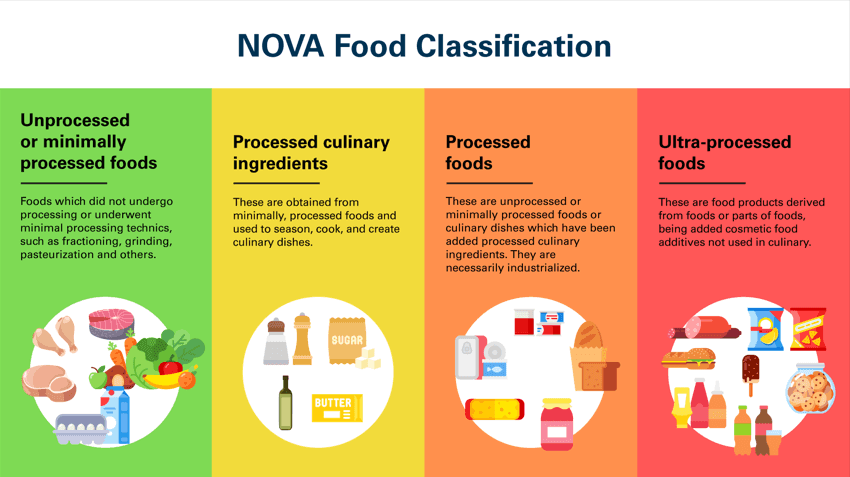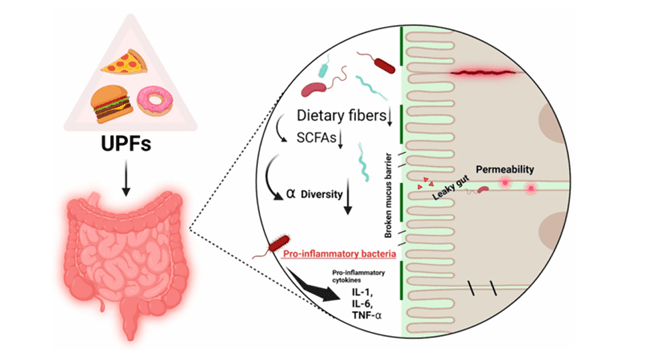The Hidden Toll of Ultra-Processed Foods on Your Gut Microbiome
Ever reached for chips, fast food, frozen meals, or other ultra-processed foods (UPFs) when you needed something quick? You're not alone. These convenience foods and pre-prepared foods fit easily into a busy lifestyle, offering instant energy in a cheap and tasty way.
But beneath the convenience, UPFs may harm your gut microbiome—the good bacteria in your digestive system that support digestion, immunity, and overall health. To understand how your own gut microbes are doing, you can also consider taking a gut microbiome test from BugSpeaks: https://bugspeaks.com/test/gut-microbiome-test/
Studies show that eating too many UPFs, junk food, refined carbs, and foods with artificial flavors can disrupt gut balance and affect other systems in the body, including inflammation and energy levels.
In this blog, we’ll briefly look at how UPFs influence gut health and what simple steps you can take to reduce their impact.
What Are Ultra-Processed Foods?
Ultra-processed foods (UPFs) are industrially made products filled with additives such as sweeteners, preservatives, emulsifiers, and artificial flavors. In contrast, natural options like fermented foods (you can learn more about them here: https://www.bugspeaks.com/blog/fermented-foods-beverages-benefits/
support healthier digestion and overall gut balance.
According to the NOVA classification system (a nutrition system that groups foods based on how much they are processed), UPFs fall under Group 4, meaning they are highly processed and contain many synthetic ingredients.
Common examples include:
Packaged snacks
Frozen meals
Processed meats
Sweetened beverages
These foods are usually high in calories and refined carbs but low in nutrients like fiber, vitamins, and minerals. That’s why they are filling but not nourishing.
Since they are cheap, tasty, and have a long shelf life, they dominate diets in many countries.
How Processing Makes UPF's Harmful
UPFs are often made using high heat in industries, which can create harmful compounds like:
Acrylamide – a chemical formed in fried or baked foods at high temperatures; linked to cancer.
Heterocyclic amines (HCAs) – chemicals formed when meats are cooked at high heat; also linked to cancer.
Polycyclic aromatic hydrocarbons (PAHs) – formed during grilling, frying, or roasting; harmful to cells.
These chemicals form when food is cooked at very high temperatures and can damage cells over time.
Food additives like flavor enhancers, coloring agents, and other synthetic ingredients may also disturb the gut, lower nutritional value, and harm beneficial gut bacteria.

Figure 1: NOVA classification of food based on the level of processing done
Gut Microbiome: The Unsung Hero
Akkermansia muciniphila and Faecalibacterium prausnitzii produce short-chain fatty acids (SCFAs), which are essential for maintaining gut-barrier integrity.
Your gut hosts trillions of microbes, bacteria, fungi, and more that make up the microbiome. This complex ecosystem supports digestion, strengthens immunity, and influences mood through the gut–brain axis. Beneficial bacteria like Akkermansia muciniphila and Faecalibacterium prausnitzii produce short-chain fatty acids (SCFAs), which are essential for maintaining gut-barrier integrity.
A diverse microbiome acts as a shield against pathogens and inflammation. However, modern dietary habits, especially high intake of UPFs can disrupt this balance, leading to dysbiosis. This shift favors harmful bacteria, increases inflammation, and weakens the gut barrier, ultimately compromising overall health.
How UPFs Wreak Havoc on Your Gut
UPFs harm the gut microbiome in multiple ways. Their low fibre content deprives beneficial bacteria of essential fuel, while additives like emulsifiers (such as carboxymethylcellulose) encourage pro-inflammatory microbes. Research shows that UPFs lower microbial diversity, increase pathogen growth, and weaken the gut barrier leading to increased gut permeability, or “leaky gut.”
Emulsifiers have been shown to reduce SCFA production and trigger inflammation, while high saturated fats in UPFs further promote harmful bacteria. Overall, UPFs create conditions where bad microbes thrive, the protective mucus layer thins, and toxins can more easily enter the bloodstream.

Figure 2: Visual representation of leaky gut pathway caused by UPF and lack of diversity of microbes
The Health Ripple Effects
The impact of UPFs goes far beyond the gut. Dysbiosis caused by these foods is linked to metabolic syndrome, type 2 diabetes, and cardiovascular disease. A 2023 study also reported that higher UPF consumption may increase the risk of colorectal cancer, likely due to microbiome disruptions.
UPF-related imbalance can interfere with normal gut–brain communication, contributing to mood issues like depression and even cognitive decline. Eating large amounts of UPFs especially at irregular times may also disturb sleep patterns and disrupt the body's natural circadian rhythm.
Fighting Back: Dietary Strategies to Rebalance Your Gut
Cut down on ultra-processed foods and switch to whole foods like fruits, veggies, whole grains, and lean proteins to support good bacteria. If you're noticing signs that your gut might already be out of balance, you can read more here: https://www.bugspeaks.com/blog/5-signs-gut-microbiome-is-out-of-balance/ .Boosting fibre with nuts, seeds, legumes, and whole grains helps beneficial microbes make SCFAs that heal the gut barrier.
Add fermented foods like yogurt, kefir, kimchi, and sauerkraut for natural probiotics. You can also use probiotics (e.g., Lactobacillus, Bifidobacterium) and prebiotic supplements like inulin. Regular exercise, stress control, and good sleep further support a healthy, balanced gut.
Wrapping Up: Choose Wisely for a Healthier Gut
UPFs may be quick and tasty, but research shows they can reduce gut microbial diversity, trigger inflammation, and increase long-term disease risk. Choosing fibre-rich foods, fermented foods, and reducing your UPF intake even gradually can help restore balance and support a healthier gut microbiome.
Small, consistent changes in your daily meals can make a big difference. Nourish your gut, protect your health, and let your microbes thrive.
-Aravind Krishna
References
Monteiro, C. A., Cannon, G., Moubarac, J. C., Levy, R. B., Louzada, M. L., & Jaime, P. C. (2018). The UN Decade of Nutrition, the NOVA food classification and the trouble with ultra-processing. Public Health Nutrition, 21(1), 5–17. https://doi.org/10.1017/S1368980017000234
Cordova, R., Viallon, V., Fontvieille, E., Peruchet-Noray, L., Jansana, A., Wagner, K. H., ... & Tjønneland, A. (2023). Consumption of ultra-processed foods and risk of multimorbidity of cancer and cardiometabolic diseases: A multinational cohort study. Lancet Regional Health - Europe, 35, 100771. https://doi.org/10.1016/j.lanepe.2023.100771
Raoul, P., Cintoni, M., Palombaro, M., Basso, L., Rinninella, E., Gasbarrini, A., & Mele, M. C. (2022). Food Additives, a Key Environmental Factor in the Development of IBD through Gut Dysbiosis. Microorganisms, 10(1), 167. https://doi.org/10.3390/microorganisms10010167
Chassaing, B., Compher, C., Bonhomme, B., Liu, Q., Tian, Y., Walters, W., ... Gershuni, V. (2022). Randomized Controlled-Feeding Study of Dietary Emulsifier Carboxymethylcellulose Reveals Detrimental Impacts on the Gut Microbiota and Metabolome. Gastroenterology, 162(3), 743–756. https://doi.org/10.1053/j.gastro.2021.10.028
Daniel, N., Gewirtz, A. T., & Chassaing, B. (2023). Akkermansia muciniphila counteracts the deleterious effects of dietary emulsifiers on microbiota and host metabolism. Gut, 72(5), 906–917. https://doi.org/10.1136/gutjnl-2021-326835
Fiolet, T., Srour, B., Sellem, L., Kesse-Guyot, E., Allès, B., Méjean, C., ... & Touvier, M. (2018). Consumption of ultra-processed foods and cancer risk: Results from NutriNet-Santé prospective cohort. BMJ, 360, k322. https://doi.org/10.1136/bmj.k322
Monteiro, C. A., Cannon, G., Levy, R. B., Moubarac, J. C., Louzada, M. L., Rauber, F., ... & Cediel, G. (2019). Ultra-processed foods: What they are and how to identify them. Public Health Nutrition, 22(5), 936–941. https://doi.org/10.1017/S1368980018003762
Severino, A., Tohumcu, E., Tamai, L., Dargenio, P., Porcari, S., Rondinella, D., ... & Cammarota, G. (2024). The microbiome-driven impact of western diet in the development of noncommunicable chronic disorders. Best Practice & Research Clinical Gastroenterology, 72, 101923. https://doi.org/10.1016/j.bpg.2023.101923
Mazloomi, S. N., Talebi, S., Mehrabani, S., Bagheri, R., Ghavami, A., Zarpoosh, M., ... & Kermani, M. A. H. (2023). The association of ultra-processed food consumption with adult mental health disorders: A systematic review and dose-response meta-analysis of 260,385 participants. Nutritional Neuroscience, 26(5), 913–931. https://doi.org/10.1080/1028415X.2022.2086066
Depommier, C., Everard, A., Druart, C., Plovier, H., Van Hul, M., Vieira-Silva, S., ... & Cani, P. D. (2019). Supplementation with Akkermansia muciniphila in overweight and obese human volunteers: A proof-of-concept exploratory study. Nature Medicine, 25(7), 1096–1103. https://doi.org/10.1038/s41591-019-0495-2